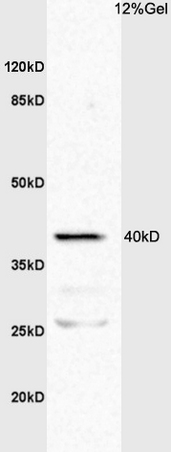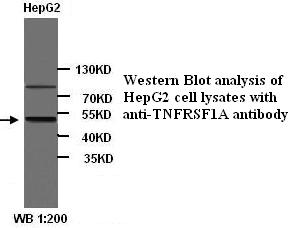TNF Receptor I antibody [H398] (Low Endotoxin)
GTX00577-00
ApplicationsFunctional Assay, Flow Cytometry, ImmunoPrecipitation, ImmunoHistoChemistry, ImmunoHistoChemistry Frozen, ImmunoHistoChemistry Paraffin
Product group Antibodies
ReactivityHuman
TargetTNFRSF1A
Overview
- SupplierGeneTex
- Product NameTNF Receptor I antibody [H398] (Low Endotoxin)
- Delivery Days Customer9
- ApplicationsFunctional Assay, Flow Cytometry, ImmunoPrecipitation, ImmunoHistoChemistry, ImmunoHistoChemistry Frozen, ImmunoHistoChemistry Paraffin
- CertificationResearch Use Only
- ClonalityMonoclonal
- Clone IDH398
- Concentration1 mg/ml
- ConjugateUnconjugated
- Gene ID7132
- Target nameTNFRSF1A
- Target descriptionTNF receptor superfamily member 1A
- Target synonymsCD120a, FPF, TBP1, TNF-R, TNF-R-I, TNF-R55, TNFAR, TNFR1, TNFR55, TNFR60, p55, p55-R, p60, tumor necrosis factor receptor superfamily member 1A, TNF-R1, TNF-RI, TNFR-I, tumor necrosis factor binding protein 1, tumor necrosis factor receptor type 1, tumor necrosis factor-alpha receptor
- HostMouse
- IsotypeIgG2a
- Protein IDP19438
- Protein NameTumor necrosis factor receptor superfamily member 1A
- Scientific DescriptionThis gene encodes a member of the TNF receptor superfamily of proteins. The encoded receptor is found in membrane-bound and soluble forms that interact with membrane-bound and soluble forms, respectively, of its ligand, tumor necrosis factor alpha. Binding of membrane-bound tumor necrosis factor alpha to the membrane-bound receptor induces receptor trimerization and activation, which plays a role in cell survival, apoptosis, and inflammation. Proteolytic processing of the encoded receptor results in release of the soluble form of the receptor, which can interact with free tumor necrosis factor alpha to inhibit inflammation. Mutations in this gene underlie tumor necrosis factor receptor-associated periodic syndrome (TRAPS), characterized by fever, abdominal pain and other features. Mutations in this gene may also be associated with multiple sclerosis in human patients. [provided by RefSeq, Sep 2016]
- ReactivityHuman
- Storage Instruction2°C to 8°C
- UNSPSC12352203





